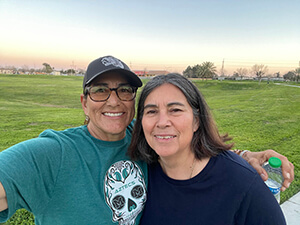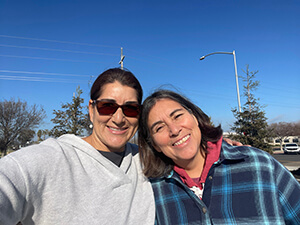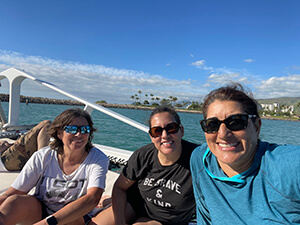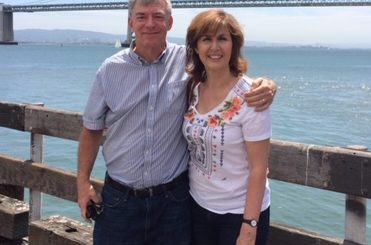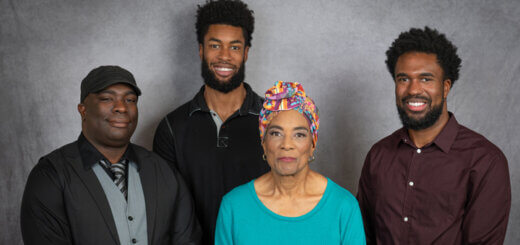Sisterly love: Younger sister becomes primary caregiver for older sister with dementia
For Siblings’ Day we’re highlighting Jill, the primary caregiver for her sister Gale who is living with dementia. Jill tells the story of how she and her family missed the early signs of the disease. She also shares how emotionally challenging it was to get a diagnosis and move her sister into a care setting. Despite this, Jill has found that the disease has brought her and her sister closer together.
Growing up
Growing up, Gale, the oldest of four siblings, excelled in school, played sports and was well liked. Jill, the sister who was the closest in age to Gale, always looked up to her. “We were a military family and moved around a lot,” said Jill. “We had a good relationship. We spent lots of time together.”
After high school, their parents moved to Italy with their younger siblings leaving the older girls behind. Gale stayed in Fresno, and Jill moved to Colorado to attend the Airforce Academy. A year later, Jill moved back to Fresno moving in with Gale and her roommate.
As they began their adult lives, Jill and Gale grew apart. Where Jill preferred quiet outdoor activities like hiking, Gale preferred social activities like Sunday brunch and visiting casinos.
Jill attended Fresno State and became a teacher. Gale, who loved animals, became a Respiratory Therapist at the Community Regional Medical Center. Later, Gale would move to Madera County and marry a woman who also loved with animals. The two became very involved with animal rescue, bringing many animals home to care for.
A downward spiral
In 2017, the whole family went on a trip to Europe. Gale spent a lot of time on the trip looking for lost items. “The whole vacation Gale couldn’t keep track of her passport, wallet and backpack,” said Jill. “It was a constant moment of panic as we looked for Gale’s belongings.”
The next year, in 2018 Gale’s wife shared that Gale was depressed and was drinking a lot on her days off. Because the couple lived in Madera, Jill and her family didn’t see Gale very often, and this news surprised them. The family wondered if Gale had been drinking in Europe, but they couldn’t recall seeing her doing it. The next year, Gale and her wife divorced. It was after Gale moved in with Jill that she finally saw her sister struggle with alcohol.
When Gale moved into her own home, the family noticed that Gale’s ability to take care of herself started to decline. She was getting in minor car accidents, losing items, and was paranoid that someone was taking her things. “Gale insisted she did not have a problem with drinking,” said Jill. “But due to her unusual behaviors, I have to admit that I did not believe her.”
Losing her job
In 2020, just as the COVID-19 pandemic was setting in, Gale broke her finger and was out of work for a few months. When she returned to work, she couldn’t understand the new protocols that were in place. On slow days, Gale became the first to volunteer to go home, which was out of character for her.
“She absolutely loved her job and was one of the best [respiratory therapists] in the ER and trauma department,” said Jill. “She tried to go back [after breaking her finger] and she was just lost. They had her shadow somebody for 30 days. She wasn’t picking up the new computer system for entering treatment codes. [First], they took her out of trauma and she loved trauma. [Then the hospital] let her go. I thought, ‘This is the bottom, it can’t get any worse,’ and then it did.”
Failing the assessment
By June of 2022 Gale, who lived about a mile from her parents in Chowchilla, was spending most days at her parent’s house. Her mother would take her home at night, but after the death of Gale’s dog, she couldn’t be left at home alone any longer. “She kept saying ‘Where’s Lexi? Can you help me find her?’” said Jill. “Gale would go out to look for Lexi and get confused about where she was.”
This is when Jill and her other sister Renee, who were both teachers, decided that the summer of 2022 was going to be the time to get some answers. Jill made an appointment at the doctor for Gale, who insisted she was fine but went along anyway.
At the appointment they performed a cognitive test and Jill wasn’t surprised when Gale couldn’t tell them who the President of the United States was. However, when Gale couldn’t remember her own birthday or what year it was, Jill cried.
“I watched Gale try her hardest to complete the tasks in the mental assessment and I cried as I saw her inability to perform some of the simplest requests,” said Jill. “When they had her draw a clock she couldn’t draw circles, she couldn’t put her pen on the paper to do anything. She thought they wanted her to draw a hand [instead of the hand of a clock].”
Gale was diagnosed in the moderate stage of younger-onset (under the age of 65) posterior cortical atrophy (PCA) which refers to gradual and progressive degeneration of the outer layer of the brain (the cortex) in the part of the brain located in the back of the head (posterior). Some studies have found that about 5% of people diagnosed with Alzheimer’s disease have PCA. However, because PCA often goes unrecognized, the true percentage may be as high as 15%.
Missing the signs
Knowing what she knows now, Jill can look back and see that what they thought was Gale drinking too much, was actually the early signs of dementia. Memory loss that disrupts daily life may be a symptom of Alzheimer’s or other dementia. There are 10 warning signs and symptoms.
Here are six of the signs that Gale was showing prior to her diagnosis:
- Memory loss that disrupts daily life
- Challenges in planning or solving problems
- Trouble understanding visual images and spatial relationships
- Misplacing things and losing the ability to retrace steps
- Withdrawal from work or social activities
- Changes in mood and personality
Finding a care setting
Around the same time Gale received her diagnosis, she officially moved back in with her parents. Jill and Renee would come over often to help give their parents a break and spend time with Gale. However, as the disease progressed, Gale would sometimes not recognize her parents and would call Jill to ask her to come get her. By November of that year, it became clear that Gale was going to need more help than the family could give her.
Together with Renee’s help, the two sisters searched for and found a care setting in Los Banos. The care setting is in a sort of middle ground for the entire family, with Jill driving the farthest at an hour and 20 minutes. Staff members from the care setting came out to Gale’s house to meet her and later the family went to the care setting to have lunch to help Gale get familiar with the place.
“Taking care of Gale has truly been taxing on our whole family,” said Jill. “We worked together on placement, doctor’s appointments, medical and financial powers of attorney and anything else that Gale needed. However, this type of care requires that someone take the lead and that person has been me. My life has been turned upside down. I am still struggling to figure out what life will look like as this disease continues to take my sister away.”
Caring for her sister
Even though Jill and Gale had grown apart in their adulthood, this disease has brought them back together. “One crazy twist to this devastating situation is that Gale and I are closer than we have ever been before,” said Jill. “For some reason, she has trusted and allowed me to do what I can to help her. Gale always thanks me and compliments me and tells me what a good sister I am. I try to visit her at least weekly and spend some quality time making each other laugh and dream. We talk about trips we will take after I retire.”
Ask for and accept help
Jill encourages other caregivers to not be afraid to reach out for help. “Share what is happening, ask friends for help, NETWORK!” said Jill. “You’d be surprised how many friends have connections [to the disease] you didn’t know about. There is so much to know and you don’t have any idea where to start. Because I made calls and reached out, I was able to navigate social services, Medi-Cal, Social Security and legal appointments. Ask for and accept help.”
One good place to start is the Alzheimer’s Association 24/7 Helpline (800.272.3900). This free service offers support for people living with dementia, caregivers, families and the public. Connect with a live person who can provide information, local resources, crisis assistance and emotional support.
Jill has also started taking photos with her sister and wishes she’d started sooner. “I don’t want Gale to be gone or not know us anymore and wish I’d taken more photos,” said Jill “I take pictures and video every chance I get.”
For more information on resources visit alz.org or call our 24/7 Helpline at 800.272.3900.





